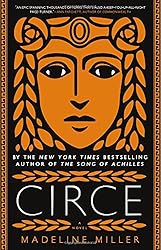Circe (Miller)
| Article Index | Summary | Author Bio | Book Reviews | Discussion Questions | Full Version |
|---|
Circe
Madeline Miller, 2018
Little, Brown and Co.
400 pp.
ISBN-13: 9780316556347
Summary
The daring, dazzling and highly anticipated follow-up to the New York Times bestseller The Song of Achilles
In the house of Helios, god of the sun and mightiest of the Titans, a daughter is born.
But Circe is a strange child—not powerful, like her father, nor viciously alluring like her mother. Turning to the world of mortals for companionship, she discovers that she does possess power—the power of witchcraft, which can transform rivals into monsters and menace the gods themselves.
Threatened, Zeus banishes her to a deserted island, where she hones her occult craft, tames wild beasts and crosses paths with many of the most famous figures in all of mythology, including the Minotaur, Daedalus and his doomed son Icarus, the murderous Medea, and, of course, wily Odysseus.
But there is danger, too, for a woman who stands alone, and Circe unwittingly draws the wrath of both men and gods, ultimately finding herself pitted against one of the most terrifying and vengeful of the Olympians.
To protect what she loves most, Circe must summon all her strength and choose, once and for all, whether she belongs with the gods she is born from, or the mortals she has come to love.
With unforgettably vivid characters, mesmerizing language and page-turning suspense, Circe is a triumph of storytelling, an intoxicating epic of family rivalry, palace intrigue, love and loss, as well as a celebration of indomitable female strength in a man's world. (From the publisher.)
Author Bio
• Birth—July 24, 1978
• Where—Boston, Massachusetts, USA
• Raised—New York, New York
• Education—B.A., M.A., Brown University
• Awards—Orange Prize-Fiction
• Currently—lives in Cambridge, Massachusetts
Madeline Miller was born in Boston and grew up in New York City, New York, and Philadelphia, Pennsylvania.
She attended Brown University, where she earned her BA and MA in Classics. She has also studied at the University of Chicago’s Committee on Social Thought, and in the Dramaturgy department at Yale School of Drama, where she focused on the adaptation of classical texts to modern forms.
Miller has been teaching and tutoring Latin, Greek and Shakespeare to high school students for more than a decade. She currently lives in Cambridge, Massachusetts.
Miller's first novel, The Song of Achilles (2011) won the 2012 Orange Prize for Fiction. Her second novel is Circe (2018). (Adapted from the publisher and Wikipedia.)
Book Reviews
(Starred review.) Weaving together Homer’s tale with other sources, Miller crafts a classic story of female empowerment. She paints an uncompromising portrait of a superheroine who learns to wield divine power while coming to understand what it means to be mortal.
Publishers Weekly
(Starred review.) Drawing on the mythology of the classical world, Miller deftly weaves episodes of war, treachery, monsters, gods, demigods, heroes, and mortals into her second novel of the ancient world.… [A]absorbing and atmospheric. —Jane Henriksen Baird, formerly at Anchorage Public Library, AK
School Library Journal
[S]tirring.… Miller beautifully voices the experiences of the legendary sorceress Circe.… This immersive blend of literary fiction and mythological fantasy demonstrates that the Greek myths are still very relevant today.
Booklist
(Starred review.) A retelling of ancient Greek lore gives exhilarating voice to a witch."Monsters are a boon for gods. Imagine all the prayers." So says Circe, a sly, petulant, and finally commanding voice that narrates the entirety of Miller's dazzling second novel.
Kirkus Reviews
Discussion Questions
1. How would you describe the personality that Madeline Miller crafts for Circe? Why is she so roundly dismissed, bullied, and belittled by her fellow immortals? Talk about the ways in which this treatment shapes her character. Despite her ancient, mythological roots, do you relate to Circe?
2. Follow-up to Question 1: In what way is Circe's desire for vengeance at odds with her inherent compassion?
3. How does the ancient Greek society, at least in the realm of the deities, view and treat women.
4. Follow-up to Question 3: Circe tells us:
It is a common saying that women are delicate creatures—flowers, eggs, anything that may be crushed in a moment’s carelessness. If I had ever believed it, I no longer did.
How does Circe disprove the widespread view of women as fragile?
5. Talk about Circe's attitude toward motherhood: as she says, despite all her military style preparations, it was "not enough." What does she mean, and what kind of a mother does Circe end up becoming?
6. What does Circe mean when she says, "All my life had been murk and depths, but I was not a part of that dark water. I was a creature within it"?
7. How does the author portray the love affair between Circe and Odysseus? If you are familiar with The Odyssey, how does the novel differ from Homer's telling (or does it)?
8. How does Miller depict many of the legendary characters of Greek mythology, including Odysseus, Daedalus, Hermes, among others? In other words, how does she flesh out their "human" traits as distinct from their godlike or heroic ones?
9. What did you know of Greek mythology before reading Circe? If you had some prior familiarity with the mythical figures and their stories, has Miller's novel added to or changed your understanding or appreciation of them?
(Questions by LitLovers. Please feel free to use them, online and off, with attribution. Thanks.)
Site by BOOM
![]()
LitLovers © 2024


